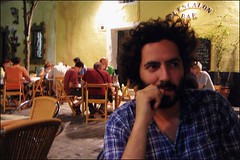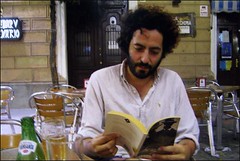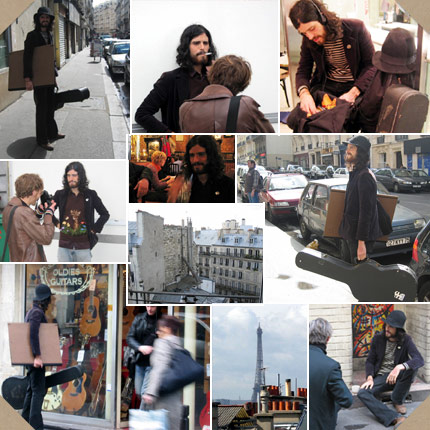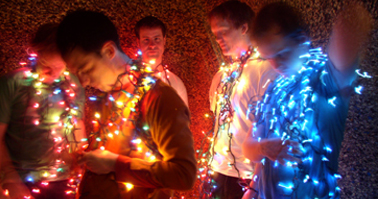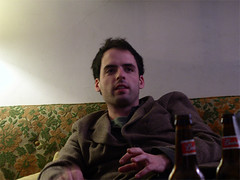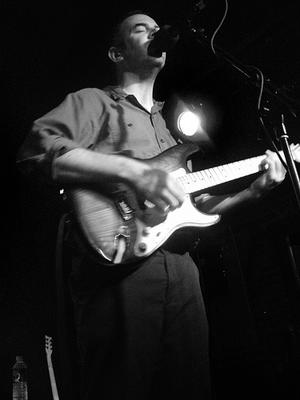
Charles Bissell / photo credit: Kathryn Yu
The trials and tribulations of New Jersey indie rock machine, The Wrens, have taken on near mythic proportions in some circles. From being signed to one indie label and then 'leaving' to sign with another after the former became the type of outfit that followed a completely different 'Creed'; the men of The Wrens soon enough began recording. And recording, and then re-recording and again re-recording, the outstanding songs we would come to know as one of the top indie rock albums of 2003, The Meadowlands. Now, between countless tour jaunts, hour upon numbing hour in a claustrophobic van, and living before the glassy gaze of documentary cameras, The Wrens are beginning to record again. Charles Bissell, The Wrens lead singer, took some time while travelling home by train to type up some answers posed by *sixeyes blogger and betterPropaganda contributor, Alan Williamson, below are the results of Charles Wren's fingers tapping the keys.
*Sixeyes: I read that you are releasing an expanded version of the Abbott 1135 EP, so how is work going on the re-do/re-mix/re-hash, as you put it? And why take the time to re-work these old songs?
Charles Bissell: Hmmm... work has been somewhat stalled for a while, ironically (in the more mod meaning of ‘ironic’, I guess) because we’re ramping up to start the next album which as I type this (later at night, Monday, 9/12/05), should be starting in the next week or two. So progress is mixed – exciting to be finally starting something new (even The Meadowlands songs were a year or two old when that was started in January of ’99) but also, being ready to do that means we can get back on track with finishing the ep redux.
With that in mind, I guess ‘why’ is a pretty good question. If time is kind of crucial why waste it re-doing old stuff? I guess part of it is because we can (because it is there?). Camille Sciara, who originally signed us to our first recording contract thingie with Grass, and who we later did the EP for in ’97 after we had all left Grass as it morphed into the evil empire of Wind-Up, was kind of to allow us to have the rights and to re-release it.
The re-doing comes in because those songs were never quite finished the way they should’ve been - mostly ‘cause I just had WAY less idea what I was doing then.
Another wee irony being that originally re-releasing this was Cory Brown, our Absolutely Kosher label guru’s idea, as a way of having something done sooner than later to put out before stressing on a new album. Now here we’re starting that and the ep is still in limbo land. Ironique, non?
*Six: I also heard there would be additional tracks on the EP. Are these new tracks or are you saving the latest work for your next complete full length?
Charles: Yeah, they’ll be tracks written/recorded around the same time as the original ep that just never saw the light of day. Whether they’ll be worth it….? Debatable. Or I guess, we’ll see. That’s where some of the bogging down has come up – not just which songs but also, if we’re redoing the original six, should the bonus ones be redone also? Who knows/cares. We’ll see.
*Six: Has work begun on the new album? And is it true you had no new songs to take into the studio to begin recording the new record? Do you have any now?
Charles: I guess I already covered some of this above, but yes, it’s true that I didn’t – and still don’t – have any new songs to start with. Kev however, has a lot, I think. But songs or a lack of songs has never been a problem. That probably sounds not the way I intend and it’s not like I can sit down with a quill and an inkwell and scratch these out on parchment at will. But it’s more that, in my experience, thinking of the song as just the melody and chord progression is too something... too reductionist? Is that the right word?
It’s only a part of the picture. The arrangements, tempo, various guitar/keyboard/vocal parts, drum sounds, recording choices, reverbs, overall color etc. count for just as much. Maybe it’s that we’re not songwriters in some kind of Brill Building way, per se, where all the effectiveness comes from how the melody moves through the chords and at what rhythm & tempo. But then again, who is any more? Even the Brill Building writers were dependant on those amazing recorded versions, you know? Each one as identifiable and as important as the original ‘song’, you know? So I guess, I just think of us as making records – albums specifically – and the ‘song’ is just one part of that.
*Six: With a band like yours, which tours so often, I'd think that you would knock out an album in 2 or 3 weeks, but that doesn't happen. Are all you guys' perfectionists, or what? And if not all of you, who is the perfectionist in the band?
Charles: Ha... you’re emailing with him. It’s also that recordings and live are essentially very different or at least for most bands, and ours especially. Part of it’s dependent on how you work – as a band, I mean. But looking ahead, maybe talking about that’s already built into the next question….
*Six: Your recordings are so dense, so full to the brim with sound and ideas, was there a specific band's music which influenced the path you've taken to get The Wrens sound to where it is today? And come to think of it was the sound you've found a deliberate thing, or was it happenstance?
Charles: Thanks very much – truly. The recordings are dense for some of the same reasons that we don’t pop a newborn album out in even nine months. Hopefully, on this next one, some of that will change, but in the past and on The Meadowlands in particular, the album was arranged and recorded relatively quickly – between January and say, March or April of 1999. But even by June or July, as overdubs continued (getting a better guitar sound, an ‘official’ lead vocal take etc.) it became increasingly obvious (to me, at least, or maybe me at first) that we were dealing with an... um... album that was not coming out as planned.
So over the next 3 and a half years or so, as I figured out where I was going wrong and refound (refound?) my bearings or whatever, and as we all kind of did the same thing, the album progressed and changed over and over through overdubs. Some songs less than others but some almost completely. Where the original full-band song that was recorded was gradually scraped away over time and changed bit by bit until, by the final version, only the original drum take remained. Everything else from the melody and/or chord progression to what instruments we're playing was different than what had originally been written, rehearsed and recorded. A stupid way to work, I know and not recommended, young ones.
That’s The Meadowlands. In general though and to answer the second part, I think one of the ways that seeing live music vs. hearing an album differs, is maybe in the word ‘seeing’. Like we all say, ‘I’m going to see this band’ etc. And I think it’s because purely the music, is only part of the whole deal. We’re still animals and seem to me to be wired to respond to a huge number of signals in any kind of interaction with the other apes, if that makes a certain David-Lee-Roth sense.
So that when one hears just the music extracted from a live show, sometimes it doesn’t measure up to the experience of being there because you can’t see all the million subtle things we respond to in a human way – the performer’s facial expressions (maybe they’re sincere, maybe they make it seem forced or pretentious), the gestures and body language, the effect of the lighting hitting guitars, or whatever. All of that ‘counts’ insofar as all of it has an effect on us when we’re experiencing it in addition to (and additionally having an effect on) ‘just the music’.
So in a recording, the things I respond to and value, are those things that seem to help take the place of the fact that the performer isn’t standing there in front of me. I kind of think of it as having to get our personalities down on tape but in lieu of a grimacing singer, there might be a guitar part that – to me at least – gives me a similar sensation when I hear it. In lieu of some big Rodger Daltrey/Bob Pollard mic spin at the last chorus, there might be a back-up vocal part that gives me a similar feeling instead. It may not take much (just a certain guitar reverb) or it make take a lot of those. As long as when I hear the song for the thousandth time writing/recording/mixing it, I still get that feeling like, ‘damn, I wish I was in THAT band’. Sounds dumb, cause we are in ‘that band’, obviously, but we aren’t in that song that at best, happened once that way or more likely, never happened that way – the way it appears in the recording. And the virtual/fake me that’s on there playing the maraca isn’t doing it with that pretend full band in a room somewhere. That band is an illusion and never existed in real time. Kind of sad, really. We’re not even in our band. If that makes sense. Does that make sense at all?
I guess also, songs I’ve liked the longest, or for my whole life and that I’m happiest when I stumble on on the radio or internet, are the ones that I can’t quite recreate in my head. So I’ll tend to get tired of ‘just’ a catchy melody over a relatively simple chord progression if only ‘cause I can hum it and whistle it and wear it out. But songs that have more parts, or a different chord progression in them (or just a poop-load of lyrics - ha) are harder to kind of recreate to myself just by humming so I can’t wear ‘em out as quick. And I assume, if it works that way for me, it must work that way for some other folks kind of like me (poor, poor folks).
*Six: When working in your home studio, is it a very isolating experience? I mean, does it become it's own little universe where you lose perspective... perhaps even of your own music? When you've got something new down on tape who do you trust outside of the band to play it for to get a different perspective?
Charles: Man, even as guilty as I feel for taking so long to do this interview (and again, my apologies), I’ve REALLY prattled on here. So keeping it short and I guess I’ve already answered some of this but just to add that, yeah, the studio in a way, is very isolating and one definitely loses perspective. I’ve come to think though that one of the things it’s up to me to be good at is not losing perspective. And also adopting the principle of ‘if you have to ask if it’s good, it’s probably not’. I figure that if I still want to hear it on the thousandth time of writing and recording it, maybe someone not involved would get along with it for at least a few times.
*Six: Okay, now onto being film stars: What about the documentary being shot by Kathryn Yu, has she finished shooting? Or is it still being shot? It's just that I imagine her lugging a camera after you guys 24/7.
Charles: Haaaaaa…..they have not finished shooting, no. And yeah, they have a LOT of footage (yardage? mileage?) at this point. It’s definitely very much Kathryn and company’s project and I wouldn’t wanna speak for them, but I think they had a rough plan at one point of film for a year and edit for a year. Maybe The Meadowlands curse is infectious and they’ll be working on this thing for four or five years. Yikes, I hope not. For their sake…sorry, Kathryn.
(The Kathryn that Charles Bissell refers to is Kathryn Yu, budding filmmaker and media savvy woman about New York, who is the visible force behind Little Quill Productions. A group of friends with the education, talent, and skills to accomplish the overwhelming feat of documenting the lives, onstage and off, of a constantly touring indie band like The Wrens.)
Kathryn Yu graciously took some time to answer questions about the project.
*Six: Why did you choose The Wrens as a documentary subject?
Kathryn Yu: I personally, am a huge fan, and sort of subjected my friends to it by proxy in late 2003, when I was seeing the Wrens play lots of shows in New York City. It was right after The Meadowlands came out. It wasn't so much choosing the band as a subject, but rather, their story is just too good NOT to be documented. I'm fond of saying that it's a story about rock'n'roll, the American dream, and living in New Jersey. It's about those moments in your life where you stop and wonder how the hell you ended up where you are.
One of my Little Quill cohorts, Michaela, kind of blurted out the idea to all of us after seeing The Wrens play SXSW 2004, and it stuck. She's got a Radio/TV/Film degree from UT-Austin, Christine has a Film & TV degree from NYU, Dan's been working in audio for and is currently studying radio/audio at Emerson. ...And the rest is history.
*Six: When did you start shooting and how do you know, when shooting a doc, that you've got enough footage? Is this your first attempt at documentary film making?
Kathryn: We made a rough plan of the types of stuff we wanted: live shows, formal interviews, friends/family members/industry types, practice/in-studio time, candid footage, etc. in April and May of 2004, and went from there. Production began in June of 2004. It's very much based on what's happening with the band at any one moment -- for a while we were shooting almost every show they played -- as well as who we can track down for an interview.
I can't say much about knowing when you have "enough" because our situation is such that we can always go back and fill in the gaps. I'd say it will probably be a combination of "gut" feeling and knowing we've covered most of our original plan. Also, this is my first attempt in documentary-making, though everybody else has previous experience elsewhere. And it's our first time working as a team. We were friends first, then collaborators.
*Six: I would guess that money would be the biggest road block to getting the film completed, what are some of the other things that have gotten in the way that have surprised you?
Kathryn: Definitely money! The response we've gotten from our amazingly generous contributors has been astounding. It offsets costs but not 100%. A good chunk is coming out of pocket. And we work around the fact that we all have jobs. Vacation time, travel time and expenses. When the Wrens "tour," we end up on essentially the same schedule as them. And then it's back to work or school as soon as we get home! Christine and Dan have clocked in a good number of hours driving the van with Charles, though some pretty desolate parts of the country.
Another thing that surprised me was realizing just how shy many musicians are, particularly if they're talking a band that's not their own. Talking about your own work is a necessary evil, of course, and most music journalism is in the written form, so it requires a shift in gears. But some of folks we've talked to are actually very eloquent, enthusiastic, and relaxed, like John Vanderslice, or Will Sheff and Jonathan Meiburg of Okkervil River and Shearwater.
*Six: With regards to this earlier Charles Bissell's response:
"Haaaa…..they have not finished shooting, no. And yeah, they have a LOT of footage (yardage? mileage?) at this point. It's definitely very much Kathryn and company's project and I wouldn't wanna speak for them, but I think they had a rough plan at one point of film for a year and edit for a year. Maybe The Meadowlands curse is infectious and they'll be working on this thing for four or five years. Yikes, I hope not. For their sake... sorry, Kathryn."
Kathryn said: Little Quill has captured over 125 hours of footage from all over the country. We hope (fingers crossed) to be done (or nearly done) with production by the end of the calendar year. Our original plan was to have a final cut by 2006, but that's obviously not set in stone. DiG! took seven years to complete. Some Kind of Monster was filmed over the course of three, and they ended up with 1600 hours of footage! We realize that this could drag out much longer than anticipated, and have a pact amongst ourselves not to let that happen.
It's said that for any given project you can choose two of "Good, Fast, and Cheap." We've chosen "Cheap" and "Good." So there you have it!
*Six: Do you see the daylight at the end of the documentary movie tunnel? Do you have a target date for completion, or is it more a 'hand-to-mouth' thing?
Kathryn: Our current plan is to wrap up production in a handful of months, go into post, and then hit up the festival circuit from there. After that, who knows? But there's definitely light at the end of the tunnel. We've never doubted that -- people love the Wrens, people are hungry for more from them, and theirs is a story that resonates with nearly everyone.
* * * * * * * * * * * * * * * * * *
From The Meadowlands + Everyone Chooses Sides
Sample the album digitally though eMusic's Free Trial Offer of 50 mp3 downloads.
